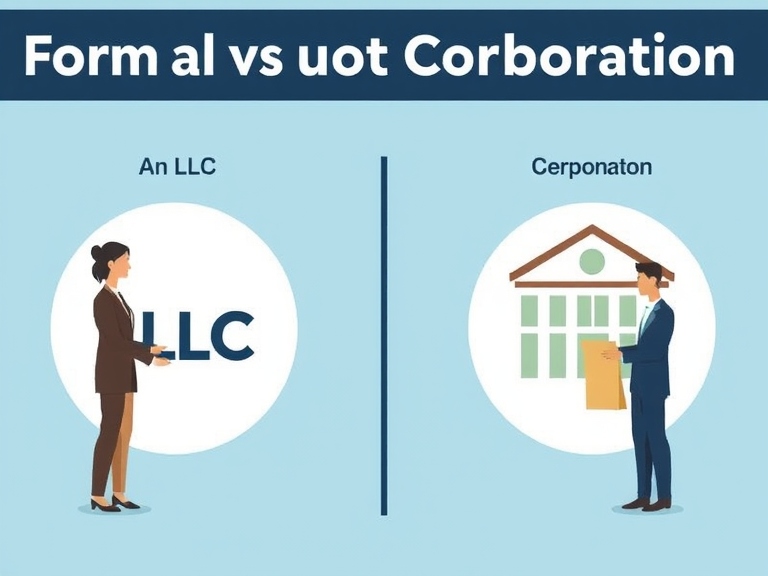When you’re starting a new business, one of the first decisions you’ll need to make is choosing the right business structure. Two of the most popular options are forming an LLC (Limited Liability Company) or a Corporation. Both offer distinct advantages, but they also come with different legal and operational requirements. If you’re unsure about which path to take, this guide will walk you through the steps for both LLCs and corporations, helping you make an informed choice.
What is an LLC vs. a Corporation?
Before diving into the formation process, it’s important to understand the difference between an LLC and a corporation.
An LLC is a flexible business structure that provides personal liability protection for its owners (members). It’s easier to manage and offers tax flexibility, making it a popular choice for small businesses.
On the other hand, a corporation is a more formal structure that is typically used by larger businesses or companies looking to raise capital. A corporation separates its owners (shareholders) from the business itself, offering strong liability protection but requiring more regulatory oversight.
Is an LLC a Corporation?
Many people ask, “Is an LLC a corporation?” The short answer is no. While both an LLC and a corporation offer liability protection, they are legally distinct entities. The key difference lies in their organizational structure and how they are taxed. Corporations are governed by more stringent rules and are subject to double taxation in some cases, while LLCs benefit from pass-through taxation, which means profits and losses are reported on the owners’ personal tax returns.
Steps to Form an LLC
If you’re leaning toward forming an LLC, here’s a step-by-step guide to help you through the process:
Choose Your State
Most entrepreneurs form their LLC in the state where they plan to operate. However, some choose states like Delaware or Nevada due to their business-friendly regulations. Keep in mind that you’ll need to register in any other state where you conduct business.
Pick a Name for Your LLC
Your LLC name must be unique and comply with your state’s LLC naming rules. Generally, the name must include “LLC” or “Limited Liability Company.”
File Articles of Organization
To officially create your LLC, you’ll need to file the Articles of Organization (sometimes called a Certificate of Formation) with the state. This document includes basic information like your LLC’s name, address, and the names of its members.
Create an Operating Agreement
Though not always required by law, an LLC Operating Agreement outlines the ownership structure, responsibilities of members, and operating procedures. It helps prevent disputes later on.
Obtain an EIN (Employer Identification Number)
Most LLCs need an EIN for tax purposes, even if they don’t have employees. You can apply for one for free through the IRS website.
File Annual Reports
Some states require LLCs to file annual reports and pay an annual fee to maintain their status.
Steps to Form a Corporation
Forming a corporation involves more formalities and paperwork, but it’s a great option if you plan to raise capital or take your business public. Here’s how to form a corporation:
Choose Your Corporation Type
You’ll need to decide whether to form an S-Corp or a C-Corp. A C-Corp is taxed separately from its owners, while an S-Corp allows profits to pass through to shareholders’ personal tax returns.
Pick a Name for Your Corporation
Similar to an LLC, your corporation’s name must be unique and should include “Inc.” or “Corporation” to signify its status as a corporation.
File Articles of Incorporation
You must file the Articles of Incorporation (also called a Certificate of Incorporation) with your state. This document includes information like your corporation’s name, business purpose, and the names of your board of directors.
Create Corporate Bylaws
Corporations are required to have bylaws, which outline the governance structure and procedures for decision-making, including how meetings will be conducted and how shares are issued.
Appoint a Board of Directors
As part of the corporation setup, you must appoint a board of directors who will be responsible for managing the company’s affairs.
Issue Stock
One of the key benefits of a corporation is the ability to issue stock to raise capital. You’ll need to determine the number of shares your corporation will issue and distribute them to the shareholders.
Obtain an EIN
Just like an LLC, your corporation will need an Employer Identification Number (EIN) from the IRS for tax reporting purposes.
File Annual Reports and Hold Meetings
Corporations are typically required to file annual reports, pay franchise taxes, and hold annual shareholder meetings to stay in compliance with state regulations.
LLC vs. Corporation: Which is Right for You?
The decision between forming an LLC or a corporation depends on your business goals. If you want a more flexible structure with fewer formalities, an LLC is likely the better option. However, if you plan to raise substantial capital, issue stock, or eventually go public, a corporation might be the way to go.
Conclusion
Forming an LLC or a corporation involves understanding the unique advantages of each structure. While an LLC offers simplicity and tax flexibility, a corporation provides more formalized control and is better suited for larger businesses or those aiming to attract investors. By following the appropriate steps, you can create the best foundation for your business’s future. Whatever choice you make, consulting with a legal or financial professional is always a wise step to ensure you’re making the right decision for your specific situation.
 :
https://in.pinterest.com/sanayakushwaha13103/
:
https://in.pinterest.com/sanayakushwaha13103/












